In a tense LaLiga match on a recent Saturday, Real Madrid faced off against Osasuna, culminating in a critical red card issued to Jude Bellingham. The match, which ended in a 1-1 draw, escalated from a moment of contention that now stirs both criticism and debate. The Spanish football federation’s disciplinary committee upheld the red card decision, resulting in a two-match ban for Bellingham, igniting a storm of discussion surrounding refereeing standards and accountability within the sport.
Both Bellingham and his coach, Carlo Ancelotti, asserted that the referee’s interpretation of the situation was misguided. This disagreement is not merely a player’s complaint; it is symptomatic of a larger issue regarding how referees manage players’ interactions on the field. Bellingham’s dismissal — driven by a supposed insult directed at referee José Luis Munuera Montero — has raised questions about the precision of communication in high-pressure contexts in professional sports.
The Nature of the Ban and the Appeal Process
Bellingham will miss crucial fixtures against Girona and Real Betis as a consequence of the upheld ban. The reaction from Real Madrid is telling; the club is immediately appealing the disciplinary ruling. It emphasizes the importance of a player’s conduct and its interpretation, and how that can critically impact a team’s momentum in a highly competitive LaLiga title race. Madrid’s concerns reflect the emotional investment and stakes of top-flight football, where every match can redefine season standings.
An interesting element of this narrative is the verbatim exchanges between Bellingham and the referee. While the referee reported that Bellingham exclaimed “f–k you,” footage appears to counter that assertion, as it captured the England international asserting, “I’m talking to you with respect.” The protestations encapsulate an inherent tension; did the referee misinterpret a moment of frustration as a personal attack, or was there indeed a lack of professionalism exhibited by a player under stress?
The Broader Implications of Refereeing Standards
This incident goes beyond a singular player’s misfortune; it raises critical questions about the refereeing framework itself. Bellingham expressed his hope that video evidence would be reviewed, intending to prevent a recurrence of miscommunication that could adversely affect a player’s career and a team’s success. Ancelotti’s assertion that linguistic barriers may have contributed to the misjudgment is profound and suggests a more significant gap in player-referee interactions worthy of systemic examination.
As this controversy unfolds, the football federation is reported to be investigating Munuera’s affiliations with various clubs, which adds another layer of complexity to the situation. Transparency in officiating is paramount for maintaining the integrity of competitive football. Scrutinizing refereeing practices alongside their relationships within the sport could restore public confidence in the fairness of officiating decisions.
The unfolding saga surrounding Jude Bellingham’s red card highlights critical deficits in the current system of officiating within professional football. The reliance on subjective interpretations under pressure calls for a reevaluation of protocols that facilitate clearer communication between players and referees. As debates ensue and appeals are made, it is essential that football takes this opportunity to reflect on how to bolster the integrity of the game while ensuring fairness for all participants. The need for a more robust and transparent refereeing approach cannot be overstated, as it influences the careers of players and the fortunes of the clubs they represent.

Leave a Reply